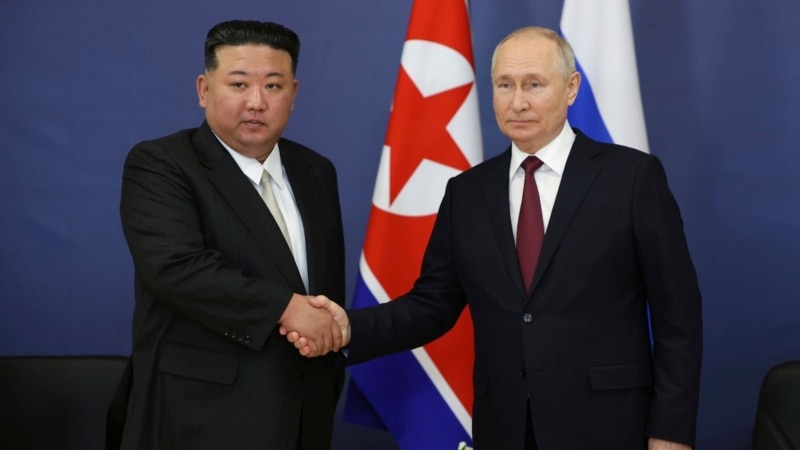
Analysts say Moscow has a range of military technologies it could provide to Pyongyang in exchange for ammunition to sustain its war in Ukraine, with advanced missile technology at the forefront.
North Korea has been supplying arms to Russia since leader Kim Jong Un visited Russia last September and met with Russian President Vladimir Putin.
South Korean Defense Minister Shin Won-sik said at a press conference on February 26 that Pyongyang has shipped approximately 6,700 containers of ammunition to Russia since September. He said the containers could hold more than 3 million 152mm artillery shells or 500,000 rounds of 122mm ammunition.
These ammunition play an important role on the battlefield. Ukrainian security services said last month that North Korean ballistic missiles had been causing civilian casualties since December.
Xin said North Korea has activated hundreds of arms factories “at full capacity” and in return, Moscow provides Pyongyang with raw materials and components for making weapons, in addition to food.
He also said Moscow was expected to transfer more military technology, which could encourage North Korea to escalate threats in the region.
South Korea’s National Intelligence Service said in November that the technology Pyongyang needed to put its Malligyong-1 satellite into orbit that same month most likely came from Russia.
But the question remains, what weapons technology is Russia willing to provide to North Korea to increase the threat it poses to South Korea and the United States?
Analysts say Russia could provide technology to improve Pyongyang’s nuclear and missile programs.
Michael O’Hanlon, director of research and foreign policy at the Brookings Institution, told VOA via email on Friday that Moscow would likely provide missile technology to North Korea “but cannot rule out nuclear weapon design information.”
Bruce Bettall, a former intelligence officer at the U.S. Defense Intelligence Agency and now a political science professor at Angelo University in Texas, said South Korea’s biggest concern is short-range ballistic missile technology, including guidance systems.
“North Korea may be looking for technology to help these missiles avoid ballistic missile defense systems when attacking South Korea,” Beitol said in a telephone interview with VOA on Monday. “The Russians do have the technology and that’s something we have to look at.”
David Maxwell, vice president of the Asia-Pacific Strategic Center, said Moscow’s transfer of intercontinental ballistic missile (ICBM) guidance and reentry capabilities would be “most dangerous to the U.S. homeland.”
Maxwell said in a telephone interview with VOA on Monday that “advanced technology and capabilities to support an intercontinental ballistic missile program” may be “what North Korea wants most.”
Analysts say Russia could also provide technology that could enhance the development of satellite cameras, submarines, advanced fighter jets, air defense capabilities and tanks.
Bruce Bennett, a senior defense analyst at the Rand Corporation, said in a phone interview with VOA this week that Russia has the technology that would allow North Korea to pack greater explosive power into a smaller warhead, but “may be unwilling to provide North Korea with advanced miniaturization technology”. technology. “
Bennett said North Korea may have a 10-kiloton nuclear warhead, but it may not have the advanced miniaturization technology to pack the 350-kiloton explosive power into a U.S. Minuteman III intercontinental ballistic missile warhead.
Analysts say that no matter what weapons technology Russia transfers, it will be difficult to detect.
Bennett noted that Russian scientists appeared to have flown from Moscow to Pyongyang on a Russian military aircraft in September, two months after North Korea launched a spy satellite.
Now that North Korea has opened its borders to Russian tourists, it may be difficult to tell whether Russians spotted in Pyongyang are military experts, Bektor said.
Russian tourists visited North Korea in February for the first time since the coronavirus pandemic began.
The North Korean information technology delegation returned home on Friday after participating in the Eurasian Information Technology Forum in Moscow. Joint Committee on Fisheries returns home from Russia on February 29, according to North Korea’s state news agency KCNA.
In addition, Kim also received Russian made vehicles Putin announced the news on February 18, according to KCNA. Russia’s state-run TASS news agency on February 19 did not confirm the make or model of the car, saying only that Kim Jong Un inspected an Aurus luxury car during his visit.
Follow us on Google news ,Twitter , and Join Whatsapp Group of thelocalreport.in















